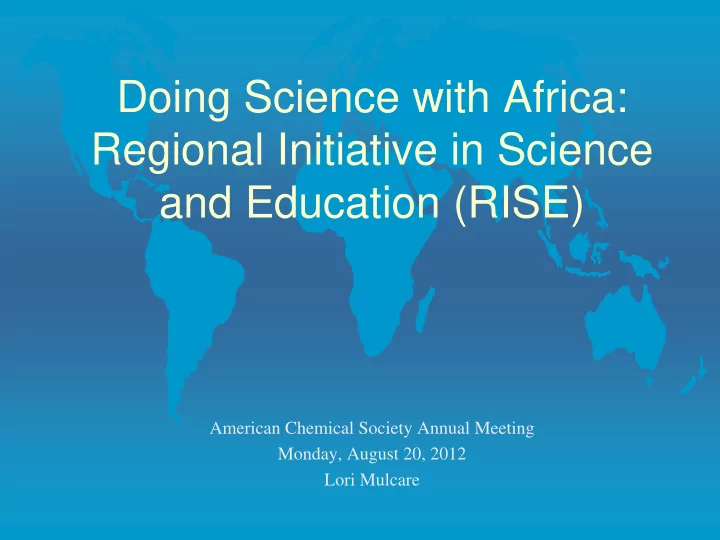

Doing Science with Africa: Regional Initiative in Science and Education (RISE) American Chemical Society Annual Meeting Monday, August 20, 2012 Lori Mulcare
Urgent need: S&T capacity building in universities • Train more next-generation faculty & support faculty development • Train technologists for private & government sectors • Provide solutions for society • Generate innovations for economic development
The past: traditional strategies • Support for individual institutions • Support for individual students & faculty • Equipment & infrastructure • Study abroad
Where traditional strategies fell short • Programs seldom designed by Africans • Failed to slow brain drain • Few institutions by themselves can support adequate science programs • Limited instrumentation at individual institutions • Students lack choice of mentors, opportunities to present work • No systematic program of faculty development & retention
Rationale for networks • Maximize use of scarce STI capacity • Integrate strengths of partners for collective benefit • Economies of scale • Opportunities to meet peers, present work • Pool instrumentation, other resources • Establish collaboration among scientists & students in region
• Trains PhD and MSc-level scientists and engineers in sub- Saharan Africa through university-based research and training networks • Funded by Carnegie Corporation of New York • Currently administered by Science Initiative Group at the Institute for Advanced Study • Partnering with African University of Science and Technology in Abuja to co-administer going forward
RISE Networks AMSEN (SA, Botswana, Kenya, Namibia, Nigeria) RISE-AFNNET (Uganda, Kenya, Tanzania) SABINA (Malawi, Namibia, Tanzania, SA) SSAWRN (SA, Botswana, Mozambique, Uganda) WIORISE (Tanzania, Mozambique, SA)
AMSEN: African Materials Science and Engineering Network Academic Director: Lesley Cornish, University of the Witwatersrand, South Africa Other participating institutions: University of Namibia University of Nairobi, Kenya Federal University of Technology, Akure, Nigeria University of Botswana
RISE-AFNNET: African Natural Products Network Academic Director: John David Kabasa, Makerere University, Uganda Other participating institutions: University of Nairobi, Kenya Sokoine University, Tanzania
SABINA: Southern African Biochemistry and Informatics Network Academic Director: John Saka, University of Malawi Other participating institutions: University of Namibia University of Dar es Salaam, Tanzania University of Pretoria, South Africa University of the Witwatersrand, South Africa CSIR, South Africa Tea Research Fdn of Central Africa, Malawi
SSAWRN: Sub-Saharan Africa Water Resources Network Academic Director: Denis Hughes, Rhodes University, South Africa Other participating institutions: Eduardo Mondlane University, Mozambique University of Botswana Makerere University, Uganda
WIORISE: Western Indian Ocean Regional Initiative Academic Director: Margareth Kyewalyanga, University of Dar es Salaam, Tanzania Other participating institutions: Eduardo Mondlane University, Mozambique University of Cape Town, South Africa
More about AFNNET and SABINA • RISE-AFNNET : Works to develop Africa’s rich biodiversity into a natural products industry of social and economic significance. Building on an already active research network of 10 member countries called NAPRECA, RISE-AFNNET expands existing research programs and formalizes educational activities in such natural products (NP) fields as engineering, biochemistry, environmental science, pharmacology, economic development and nutrition. • SABINA : Trains both PhD and MSc scientists through research in the biochemistry and chemistry of natural products, including bioinformatics as an essential tool for data management and the elucidation of structure and function. Research focuses on increasing the understanding of useful plants or fungi (such as mushrooms, seaweeds, and tea crops) through the study of screening assays, biosynthetic pathways, gene expression, modes of action, synthetic production and genetic diversity.
Sampling of student research Anthelmintic and antimicrobial activities of Commiphora swynnertonii in local chickens Pharmacological and toxicological study of Clerodendron myricoides, an ethnomedical herbal remedy used in Kenya Assessment and characterization of food consumed by Wahadzabe nomads in Meatu and Karatu Districts, Northern Tanzania Screening of Kylinga alata extracts for antimicrobial activity against some common pathogenic bacteria of the respiratory system Yield and quality decline in vegetatively propagated cultivar tea (Camellia sinensis (L.) O. Kuntze) under continuous mechanical harvesting
Results • As of spring 2012, 20 MSc, 6 PhD and 2 postdoc recipients. At end of second RISE phase in 2013, >100 RISE graduates in S&E departments in African universities, training next generation. • AFNNET: 35 post-graduate students supervising students, teaching labs, or serving as teaching assistants; 16 papers and articles with contributions by 9 students and 43 professors published/accepted in 2011. NUFU- funded HPLC for Sokoine University based on work being done. • SABINA: 19 joint activities in 2011; 20 presentations given by 16 students and 6 professors.
Opportunities for U.S. faculty & post-docs • Teach short courses in RISE institutions • Co-mentor RISE students in person and/or virtually • Engage in joint research projects • Offer entrepreneurship training • Host a visiting professor or student
International collaborations • Kele Mpho, researching in Professor Kelly Caylor’s Ecohydrology Lab in the Dept of Civil & Environmental Engineering at Princeton • Discussions with other universities including Duke and Tuskegee • Eager to add new partners
. sig.ias.edu/rise sig@ias.edu Twitter.com/SIGatIAS
Recommend
More recommend